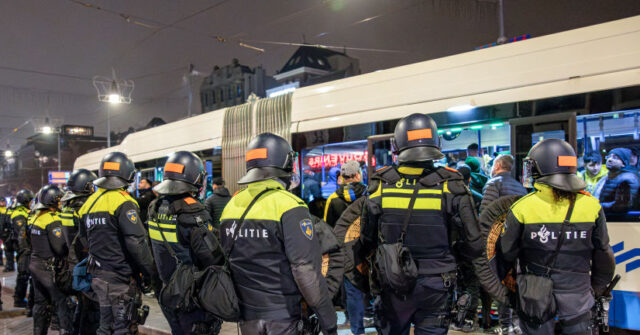We support our Publishers and Content Creators. You can view this story on their website by CLICKING HERE.

Israelis in Europe have been warned to “categorically avoid” being visibly Jewish at cultural and sporting events for the next month in the wake of a “pogrom” in Amsterdam last week, yet finding an Israeli football match to watch is becoming increasingly difficult.
Since the October 7th terrorist attacks against Israel, a strange phenomenon has befallen Israeli sport. Home games aren’t played at home — the sport’s governing body, UEFA, says it is too dangerous for players to visit — and increasingly, away games aren’t played at their host nations either.
The possibility of having Israeli footballers and fans visit foreign states is now discussed in terms like “disproportionate risk”, “security concerns”, “politically sensitive”, “high-risk”, and “fear of disturbances”. European football once had a real hooliganism problem, but sophisticated policing and social engineering through the game itself, which developed over many years, has all but removed the issue. Yet the security concerns today are not over thuggish fans but from the violent rejection of having visiting citizens from the Jewish state grace European cities at all.
This exploded onto the front pages last week with sprawling city-wide attacks on Israeli football fans by pro-Palestine thugs in Amsterdam after a Maccabi Tel Aviv match against a local team. Allegedly organised through messaging apps and with the assistance of local taxi drivers — who drove many football fans to their hotels from the airport and consequently knew where to later direct violence, it is stated in Dutch media — gangs of youths on mopeds sought out victims.
The attacks have been compared to the “pogroms” against Jews of past times by Dutch political figures from the left and right alike.
Less visible but just as insidious are the cities that refuse to allow Israeli football to visit their streets in the first place. While Israeli home games are now played in Hungary for the sake of not introducing players and tourists to a warzone, an increasing number of away games are now played there, too, as they simply aren’t welcome elsewhere. Israeli sport is verging towards exile in Budapest.
Belgium, the home of the institutions of the European Union and one of the most multicultural cities on the continent — long notorious for its stubborn population of radical Islamists — outright refused to allow Israel’s footballers to play there for the UEFA championship this year. The Belgian authorities said at the time it would be “impossible to organize this very high-risk match” due to tensions over the Israel-Hamas war.
The Brussels Signal publication reported in July that as Brussels sought to avoid exposing the city’s new multicultural population to visiting Israelis, several other Belgian cities also refused to host the games. Minister for Climate and Sports Benoît Hellings said there was a “disproportionate risk” from playing the game at home, and: “given the chance of riots, in the stadium itself, in the immediate vicinity and in the city center, we cannot take the risk of endangering the safety of our fellow citizens.”
The publication cited French populist-right politician Damien Rieu, who said of the decision: “Outside of a war situation, this is the first time, to my knowledge, that a European country has officially recognized that it is no longer master of its territory, due to an overly pressing Arab-Muslim presence”. Le Monde reported then that “the decision was made for security reasons, as all the cities in Belgium had refused to host such a fixture due to fear of disturbances”, underlining the view the country is increasingly a de facto no go zone for Israelis where the state can’t guarantee their safety.
So why, of all European states, is Hungary the sole country shouldering the responsibility of hosting Israeli footballers and fans for their home, and many of their away games?
Hungary is the natural choice for Israeli football games for several reasons, all of which boil down to the Hungarian public repeatedly voting for erstwhile anti-communist campaigner Viktor Orbán as Prime Minister.
First, Hungary has a very small resident population of people likely to be aggressively pro-Palestine, given the country has some of the lowest levels of immigration of any Western nation, a key Orbán policy of keeping ‘Hungary for Hungarians’.
Then, Hungary is very friendly with Israel, with Orbán having a strong personal relationship with Prime Minsiter Benjamin Netanyahu and frequently promoting the country as the final remaining safe haven for Jews who wish to live in peace in Europe.
Finally, Hungary has—for a country of its size—excellent infrastructure for football itself, given Orbán is a lifelong superfan of the game, has directed the construction of modern stadia, and played himself well into middle age. Orbán loves football so much that the left-wing press has criticised him in the past for his dedication to the game.
Even after the global shock at the Amsterdam “pogrom” against visiting football fans, feelings on how to approach Israeli sport still appear to be split. More Israel away games are coming up, with one “high-risk” match against France this Thursday going ahead but with considerably toughened security.
It was reported in the French national media on Tuesday morning that the French state will show solidarity with Israel over the match. Both French President Emmanuel Macron and his new Prime Minister Michel Barnier plan to attend the match.
French government minister Benjamin Haddad said today: “Israeli footballers and fans are welcome in Paris… sport must be a moment of friendship between peoples, of celebration and of gathering”. He said the presence of the top politicians at the match is a “strong message of friendship and fraternity”, and criticised for the hard left in the country calling for the match to be cancelled.
On the other end of the scale is Turkey, which is not a European state but still participates in European football and is a member of the Western NATO defensive alliance. They announced their planned November 28th match against Israel would no longer be taking place in Istanbul but had been moved to — where else — Hungary.
Enhanced police presence or not, the Israeli government is apparently taking no chances with the safety of its citizens for the game against France this week, a country with well-developed problems with multiculturalism and Islamism of its own. Israel National Security Council published warnings for citizens abroad on Monday in strong terms, stating it was: “Alerting Those Abroad to Be Aware of Intentions of Pro-Palestinian/Terrorism Supporters to Carry Out Violent Attacks against Israelis, under the Pretense of Demonstrations and Protests.”
The body said it had concerns about “terrorism/lone wolf attackers” taking advantage of anti-Israel riots in European cities to carry out attacks. The advice was to “categorically avoid attending Israeli sports/cultural events abroad” and to “be extra careful about concealing anything that could identify you as Israeli/Jewish, including when booking taxis/cars through applications.”
The France-Israel football match was specifically cited as a threat. Still, the National Security Council also stated that “preparations to harm Israelis have been identified in several European cities,” including Brussels, “major cities in the UK”, and Amsterdam.
While Israeli citizens have been clearly warned, hard experience shows that Israeli games are not the only pretext Islamists have used to kill visiting football fans in recent years. The Brussels October 2023 terror attack saw two Swedish supporters killed by an Islamic State-inspired gunman who opened fire on people wearing that country’s colours after a football match.
Attacker Abdesalem Lassoued shouted “Allahu Akbar” as he struck and is said to have been angry that the Swedish state wasn’t sufficiently deferential to Muslims by so far refusing to institute blasphemy laws. He was later found by police in the frequently terror-linked Brussels neighbourhood of Schaarbeek and received a fatal gunshot wound in the process of being arrested.

 Conservative
Conservative  Search
Search Trending
Trending Current News
Current News 







